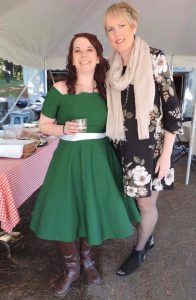What a Difference a Decade Can Make
Written by |

It’s a new year and the beginning of a new decade. Photos have been popping up all over social media, showing how people looked 10 years ago versus now. Many are sharing their accomplishments over the last decade.
When I first saw a friend’s list, I was a little taken aback. I didn’t feel as if I had accomplished a lot.
Yet, I have raised my three sons mostly singlehandedly and they have been successfully launched into adulthood.
But my career didn’t grow in the last 10 years — instead, it came to a screeching halt.
During my time as a pharmaceutical sales rep, covering a vast territory in Maine, my body started to revolt against the time I was spending behind the wheel. I finally was making enough money to provide for my sons, but I could barely move my body by the end of each day. Stairs became a source of agony; I struggled with climbing them to go to bed at night and to descend in the morning. Just over a decade ago, my doctors started to realize that something was wrong.
I tried to find a balance between what my body could handle and the requirements of my job. I left pharmaceuticals to take up a role in sales management. After that, I moved to a position in sales, then later more junior roles with less stress. Being undiagnosed meant having no effective treatment plan, so I was living in survival mode. I worked all week and spent the entire weekend recovering.
When my body started revolting in spasms from my call center job, my primary care physician looked me in the eye and told me, “This will lead to you having to stop work.” Back then, we didn’t know what “this” was. But four years ago, when I was sick for months on end, her prediction came true: I was no longer reliable in the workplace.
My interpersonal relationships took a beating as well. I was unable to handle any stress in my marriage. My physical distress was causing mental torment. I was a foster child who dreamed of having a nuclear family to call my own, and my inability to successfully navigate a marriage put even more emotional stress on me.
I realize that comparing my accomplishments to others wasn’t benefiting me. Instead, I looked closely at what I have achieved. After seeing one endocrinologist, two PCPs, three neurologists, and four rheumatologists, I finally received a diagnosis of an ultra-rare disease: Lambert-Eaton myasthenic syndrome (LEMS). Unfortunately, it is common for rare disease patients to go for years with progressing symptoms before diagnosis. It took me close to a decade.
As most LEMS patients will agree, a diagnosis brings relief because it gives us treatment options. And these options have given me back my life. When I look at a photo of me taken just after diagnosis, when I barely made it up a small hiking “hill” with friends, compared to a photo of myself with my new daughter-in-law three years later, I recognized that I am finally “me” again.
I feel incredibly fortunate to have found that LEMS was behind my decline over the past decade. With a combination of medications, treatments, and lifestyle changes, I can manage my disease, and it has led me down a career path that I hadn’t time for before: being a paid writer.
I don’t rely on one medication to manage my LEMS, but a combination of treatments: Amifampridine increases acetylcholine in my bloodstream, and mestinon keeps the acetylcholine in my blood longer. Together, the medications increase my strength and stamina. Intravenous immunoglobulin replacement therapy stops my immune system from attacking my calcium channels.
People who haven’t seen me in a while comment that I look great. I’m the poster girl for having an invisible illness. I say that I’m blessed because my neuromuscular disease has effective treatment options.
A recent post popped up in my Bionews Services Facebook feed. It brought tears to my eyes. The linked article, “Single Dose of CD45-ADC Resets the Immune System, Delays the Onset of MS in Mice,” gives me hope of a possible cure for my disease. With multiple autoimmune syndrome compounding my LEMS diagnosis, the idea of being able to give my immune system a reboot gives me hope for the future.
It’s incredible to think of the difference that a decade can make.
***
Note: Lambert-Eaton News is strictly a news and information website about the disease. It does not provide medical advice, diagnosis, or treatment. This content is not intended to be a substitute for professional medical advice, diagnosis, or treatment. Always seek the advice of your physician or other qualified health provider with any questions you may have regarding a medical condition. Never disregard professional medical advice or delay in seeking it because of something you have read on this website. The opinions expressed in this column are not those of Lambert-Eaton News or its parent company, Bionews Services, and are intended to spark discussion about issues pertaining to Lambert-Eaton myasthenia.







Leave a comment
Fill in the required fields to post. Your email address will not be published.